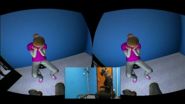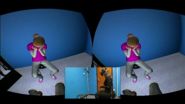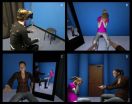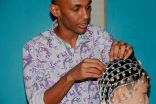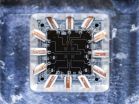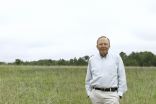Virtual reality helps people to comfort and accept themselves
2014-11-12
(Press-News.org) VIDEO:
The video illustrates the complete experiment. First the participant shown wearing the Oculus head-mounted display and the OptiTrack motion capture suit gives comfort to the crying virtual child. We see...
Click here for more information.
Self-compassion can be learned using avatars in an immersive virtual reality, finds new research led by UCL. This innovative approach reduced self-criticism and increased self-compassion and feelings of contentment in naturally self-critical individuals. The scientists behind the MRC-funded study say it could be applied to treat a range of clinical conditions including depression.
The team of psychologists and computer scientists from UCL, University of Barcelona and University of Derby designed a method to improve people's compassion to themselves, by creating a unique self-to-self situation using avatars and computer gaming technology. Virtual reality has previously been used to treat psychological disorders including phobias and post-traumatic stress disorder but this research focused on a new application for promoting emotional well-being.
In the study published in PLOS ONE today, 43 healthy but self-critical women experienced a life-size virtual body substituting their own, giving a first person perspective of a virtual room through the eyes of the avatar.
The participants were all trained to express compassion towards a distressed virtual child while in their adult virtual body. As they talked to the crying child, it appeared to listen and respond positively to the compassion. After a few minutes, 22 of the participants were then transferred to the virtual child body and from this perspective they saw their original virtual adult body deliver their own compassionate words and gestures to them. The remaining 21 participants observed their original virtual adult body express compassion to the child from a third person perspective. The participants were surveyed for mood, state and personality traits before and after the experiment using verified tests.
Professor Mel Slater, co-author from ICREA-University of Barcelona and UCL Computer Science, said: "When you wear a head-mounted display and look down towards yourself and see a virtual body replacing and moving like your own, and also see it in a mirror, this gives a powerful clue to the brain that this is your body. We have shown before that when adults are embodied in a virtual child body that this influences their perceptions of the world and themselves to become child-like. Here they experienced receiving compassion from their adult selves while embodied as a child."
Dr Caroline Falconer, first author from UCL Clinical Educational & Health Psychology, said: "Women who experienced a first person perspective through the eyes of the virtual child were soothed - they felt safe and content and had increased self-compassion and a lower level of self-criticism. For these women, we created a unique situation where they can have a kind and reassuring word with themselves. In contrast, those who experienced a third person perspective only reported reduced self-criticism, which highlights the benefit of a first person, self-to-self experience in immersive virtual reality when cultivating self-compassion."
Excessive self-criticism plays a prominent role in the development and persistence of many mental health problems including depression. The scientists say people who are self-compassionate tend to have lower levels of self-criticism and are better able to cope with negative life events because self-compassion acts as a buffer, helping to promote a positive mood and general wellbeing.
Professor Chris Brewin, study lead from UCL Clinical Educational & Health Psychology, said: "We are thrilled to see the immediate benefits the women involved in this one-off session experienced and are now pursuing a more in-depth, clinical study into our method to measure longevity of the positive effects in both healthy and depressed individuals from both sexes. We're keen to find out if the benefits for women are also seen with men and those suffering from depression. If positive, we hope virtual reality-based therapy will become a viable, low-cost treatment people can use in their own home - something we believe is achievable using commercial gaming technology."
Professor Paul Gilbert, co-author and expert in compassion focused therapy at University of Derby, said: "All over the world research is showing that compassion can have major effects on a whole range of psychological and neurophysiological processes. The big challenge is how to help people engage, generate, and experience compassion and for these to be of therapeutic benefit. This research by Prof Chris Brewin and his team is highly innovative and has contributed substantially to this endeavour and the potential for further developing the therapeutic effectiveness of compassion training."
INFORMATION:
ELSE PRESS RELEASES FROM THIS DATE:
2014-11-12
It is claimed one in five students have taken the 'smart' drug Modafinil to boost their ability to study and improve their chances of exam success. But new research into the effects of Modafinil has shown that healthy students could find their performance impaired by the drug.
The study carried out by Dr Ahmed Dahir Mohamed, in the School of Psychology at The University of Nottingham Malaysia Campus, and published today, Wednesday 12 November 2014, in the open access journal PLOS ONE, showed the drug had negative effects in healthy people.
Dr Mohamed said: "We looked ...
2014-11-12
CORAL GABLES, Fla. (Nov. 12, 2014) -- Crowdsourcing utilizes the input of a crowd of online users to collaboratively solve problems. To advance this emerging technology, researchers at the University of Miami are developing a computing model that uses crowdsourcing to combine and optimize human efforts and machine computing elements.
The new model can be used to efficiently perform the complex tasks of face recognition--a method used in law enforcement. It's a new approach to using social networks as a formal part of the criminal investigation process, explained computer ...
2014-11-12
Making friends is often extremely difficult for people with social anxiety disorder and to make matters worse, people with this disorder tend to assume that the friendships they do have are not of the highest quality.
The problem with this perception, suggests new research from Washington University in St. Louis, is that it's not necessarily true from the point of view of their friends.
"People who are impaired by high social anxiety typically think they are coming across much worse than they really are," said study co-author Thomas Rodebaugh, PhD, associate professor ...
2014-11-12
While the Martinis Lab at UC Santa Barbara has been focusing on quantum computation, former postdoctoral fellow Pedram Roushan and several colleagues have been exploring qubits (quantum bits) for quantum simulation on a smaller scale. Their research appears in the current edition of the journal Nature.
"While we're waiting on quantum computers, there are specific problems from various fields ranging from chemistry to condensed matter that we can address systematically with superconducting qubits," said Roushan, who is now a quantum electronics engineer at Google. "These ...
2014-11-12
It's not uncommon to see cameras mounted on store ceilings, propped up in public places or placed inside subways, buses and even on the dashboards of cars.
Cameras record our world down to the second. This can be a powerful surveillance tool on the roads and in buildings, but it's surprisingly hard to sift through vast amounts of visual data to find pertinent information - namely, making a split-second identification and understanding a person's actions and behaviors as recorded sequentially by cameras in a variety of locations.
Now, University of Washington electrical ...
2014-11-12
ITHACA, N.Y. - Peering deep into time with one of the world's newest, most sophisticated telescopes, astronomers have found a galaxy - AzTEC-3 - that gives birth annually to 500 times the number of suns as the Milky Way galaxy, according to a new Cornell University-led study published Nov. 10 in the Astrophysical Journal.
Lead author Dominik Riechers, Cornell assistant professor of astronomy, and an international team of researchers gazed back - with the Atacama Large Millimeter/submillimeter Array (ALMA) in Chile - over 12.5 billion years to find bustling galaxies creating ...
2014-11-12
New York, NY - The female mosquitoes that spread dengue and yellow fever didn't always rely on human blood to nourish their eggs. Their ancestors fed on furrier animals in the forest. But then, thousands of years ago, some of these bloodsuckers made a smart switch: They began biting humans and hitchhiked all over the globe, spreading disease in their wake.
"It was a really good evolutionary move," says Leslie B. Vosshall, the Robin Chemers Neustein Professor and head of the Laboratory of Neurogenetics and Behavior at The Rockefeller University, and a Howard Hughes Medical ...
2014-11-12
As cities and incomes increase around the world, so does consumption of refined sugars, refined fats, oils and resource- and land-intense agricultural products such as beef. A new study led by University of Minnesota ecologist David Tilman shows how a shift away from this trajectory and toward healthier traditional Mediterranean, pescatarian or vegetarian diets could not only boost human lifespan and quality of life, but also slash greenhouse gas emissions and save habitat for endangered species.
The study, published in the November 12 online edition of Nature by Tilman ...
2014-11-12
Menlo Park, Calif. -- A study at the Department of Energy's SLAC National Accelerator Laboratory suggests for the first time how scientists might deliberately engineer superconductors that work at higher temperatures.
In their report, a team led by SLAC and Stanford University researchers explains why a thin layer of iron selenide superconducts -- carries electricity with 100 percent efficiency -- at much higher temperatures when placed atop another material, which is called STO for its main ingredients strontium, titanium and oxygen.
These findings, described today ...
2014-11-12
Graphene is the miracle material of the future. Consisting of a single layer of carbon atoms arranged in a honeycomb lattice, the material is extremely stable, flexible, highly conductive and of particular interest for electronic applications. ETH Professor Tilman Esslinger and his group at the Institute for Quantum Electronics investigate artificial graphene; its honeycomb structure consists not of atoms, but rather of light. The researchers align multiple laser beams in such a way that they create standing waves with a hexagonal pattern. This optical lattice is then superimposed ...
LAST 30 PRESS RELEASES:
[Press-News.org] Virtual reality helps people to comfort and accept themselves
